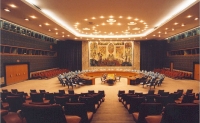Public Diplomacy and the United Nations Security Council: Securing a Seat at the Top Table
Principal Investigator:
Caitlin Byrne, CPD Research Fellow, 2010-2012
Past Contributing Researcher:
Naweed Lemar
CPD Publications:
Public Diplomacy and the United Nations Security Council: Securing a Seat at the Top Table [PDF]. CPD Perspectives on Public Diplomacy. June, 2012.
Campaigning for a Seat on the United Nations Security Council: A Middle Power Reflection on the Role of Public Diplomacy [PDF]. CPD Perspectives on Public Diplomacy. December, 2011.
This 2010-12 CPD Research Fellowship project examined why and how sovereign states use public diplomacy in the pursuit of a non-permanent seat on the United Nations Security Council (UNSC). The research for this project drew upon the experience of middle power Australia, a founding member and longstanding supporter of the United Nations, with past and current aspirations to sit at the UNSC table.
The key objectives of the project were threefold, to:
i) Assess the strategic role of public diplomacy (vis a vis traditional diplomacy) in the development of a state-initiated campaign for a non-permanent seat on the UNSC; and
ii) Examine and map the range of public diplomacy methods typically used in a campaign for the UNSC, as a tool that might inform policy-makers with regard to both strategic development and evaluation of UNSC campaigns; and
iii) Assess in qualitative terms, the soft power value (positive or negative) that is derived by the campaigning state as a result of the public diplomacy aspects of that campaign, (quite apart from whether that state is successful or unsuccessful in gaining the UNSC seat).
To date there appears to be limited discussion about how public diplomacy is used in the context of a UNSC campaign, where it otherwise encroaches upon an area of practice typically reserved for traditional diplomacy and diplomats. By drawing upon past and current Australian experiences, this research project sought to improve and develop understanding about the role and implications of public diplomacy with regard to the UNSC campaign process, as well as inform, engage and extend dialogue with practitioners as they initiate, plan and develop and most importantly evaluate their past and present campaigns for a seat at the top table.








